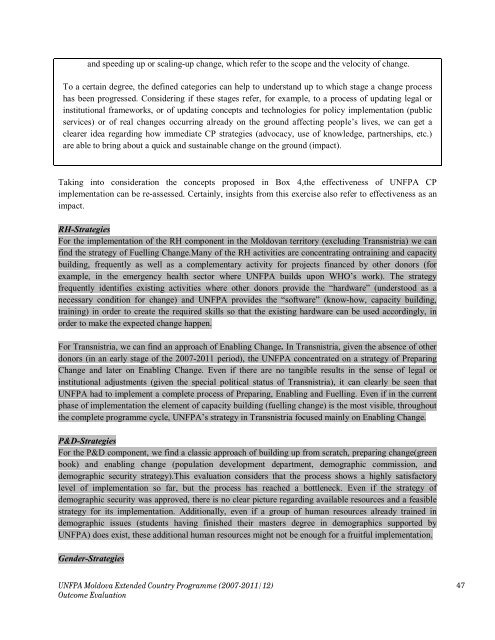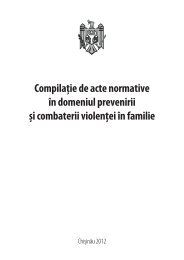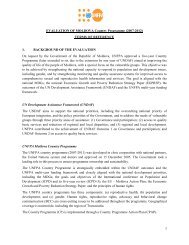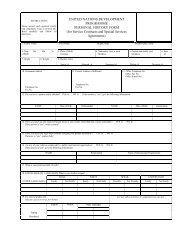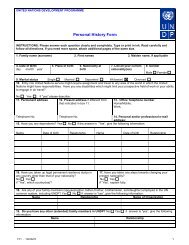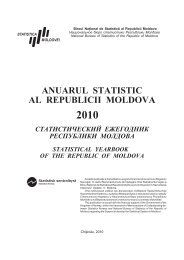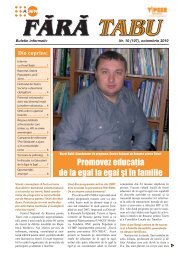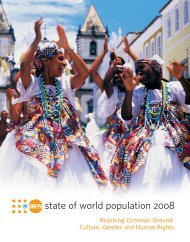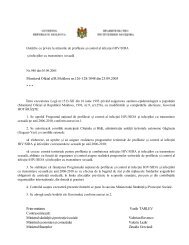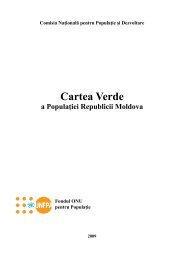Country Programme (2007-2011/2012) evaluation - UNFPA Moldova
Country Programme (2007-2011/2012) evaluation - UNFPA Moldova
Country Programme (2007-2011/2012) evaluation - UNFPA Moldova
You also want an ePaper? Increase the reach of your titles
YUMPU automatically turns print PDFs into web optimized ePapers that Google loves.
and speeding up or scaling-up change, which refer to the scope and the velocity of change.<br />
To a certain degree, the defined categories can help to understand up to which stage a change process<br />
has been progressed. Considering if these stages refer, for example, to a process of updating legal or<br />
institutional frameworks, or of updating concepts and technologies for policy implementation (public<br />
services) or of real changes occurring already on the ground affecting people’s lives, we can get a<br />
clearer idea regarding how immediate CP strategies (advocacy, use of knowledge, partnerships, etc.)<br />
are able to bring about a quick and sustainable change on the ground (impact).<br />
Taking into consideration the concepts proposed in Box 4,the effectiveness of <strong>UNFPA</strong> CP<br />
implementation can be re-assessed. Certainly, insights from this exercise also refer to effectiveness as an<br />
impact.<br />
RH-Strategies<br />
For the implementation of the RH component in the <strong>Moldova</strong>n territory (excluding Transnistria) we can<br />
find the strategy of Fuelling Change.Many of the RH activities are concentrating ontraining and capacity<br />
building, frequently as well as a complementary activity for projects financed by other donors (for<br />
example, in the emergency health sector where <strong>UNFPA</strong> builds upon WHO’s work). The strategy<br />
frequently identifies existing activities where other donors provide the “hardware” (understood as a<br />
necessary condition for change) and <strong>UNFPA</strong> provides the “software” (know-how, capacity building,<br />
training) in order to create the required skills so that the existing hardware can be used accordingly, in<br />
order to make the expected change happen.<br />
For Transnistria, we can find an approach of Enabling Change. In Transnistria, given the absence of other<br />
donors (in an early stage of the <strong>2007</strong>-<strong>2011</strong> period), the <strong>UNFPA</strong> concentrated on a strategy of Preparing<br />
Change and later on Enabling Change. Even if there are no tangible results in the sense of legal or<br />
institutional adjustments (given the special political status of Transnistria), it can clearly be seen that<br />
<strong>UNFPA</strong> had to implement a complete process of Preparing, Enabling and Fuelling. Even if in the current<br />
phase of implementation the element of capacity building (fuelling change) is the most visible, throughout<br />
the complete programme cycle, <strong>UNFPA</strong>’s strategy in Transnistria focused mainly on Enabling Change.<br />
P&D-Strategies<br />
For the P&D component, we find a classic approach of building up from scratch, preparing change(green<br />
book) and enabling change (population development department, demographic commission, and<br />
demographic security strategy).This <strong>evaluation</strong> considers that the process shows a highly satisfactory<br />
level of implementation so far, but the process has reached a bottleneck. Even if the strategy of<br />
demographic security was approved, there is no clear picture regarding available resources and a feasible<br />
strategy for its implementation. Additionally, even if a group of human resources already trained in<br />
demographic issues (students having finished their masters degree in demographics supported by<br />
<strong>UNFPA</strong>) does exist, these additional human resources might not be enough for a fruitful implementation.<br />
Gender-Strategies<br />
<strong>UNFPA</strong> <strong>Moldova</strong> Extended <strong>Country</strong> <strong>Programme</strong> (<strong>2007</strong>-<strong>2011</strong>/12)<br />
Outcome Evaluation<br />
47


